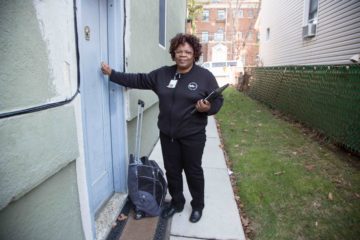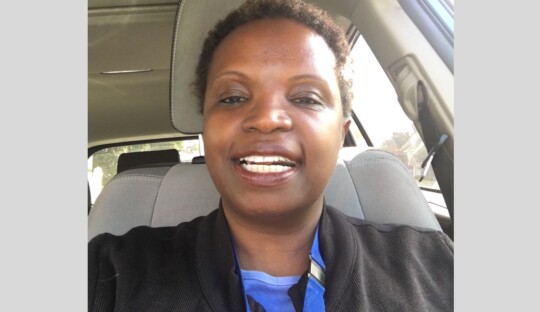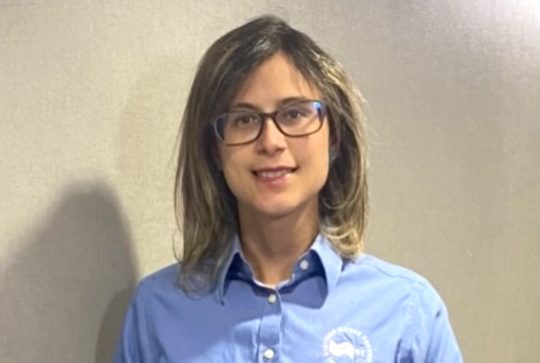RN Tinu Fadamiro Explains that How You Talk to Patients Is Just as Important as What You Say
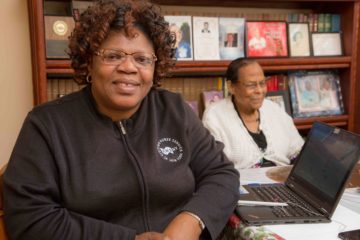
Over the past 13 years, VNSNY public health nurse Atinuke “Tinu” Fadamiro has treated patients for conditions ranging from postsurgical wounds to ostomy bag management. While her service area in Staten Island is a long way from her native Nigeria, she’s found that some of the most challenging aspects of her work at VNSNY are similar to those she faced as a sex counselor for teens back in Abuja, Nigeria’s capital city. “As nurses, the skilled interventions we’re trained to do are the part of the job we can control,” says Tinu. “We can’t regulate people’s behavior, though.” One of the biggest issues, she adds, is getting patients to fully understand the part they need to play in their own care.”
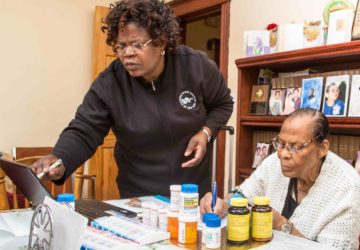
Knowing how important it is to encourage such “health literacy” inspires Tinu to be patient, compassionate—and persistent. A recent case that showed how Tinu helps patients connect the dots between their actions and health involved Junius*, a 60-year-old man originally from Cameroon. Four years ago, long before he came under VNSNY’s care, Junius was diagnosed with diabetes and put on oral insulin, but he didn’t take his meds consistently. Predictably, his diabetes got worse as a result. Eventually he was prescribed insulin injections four times a day, but was noncompliant with these injections as well.
Tinu became Junius’s field nurse this past October when Junius became a VNSNY patient. Previously he had developed an infected diabetic foot ulcer that required amputation, and now the surgical wound from the amputation wasn’t healing properly. The key for Tinu was to get Junius to take his medication as prescribed. Tinu knew she’d have to establish trust and a rapport before she could successfully educate him about his condition. Her first objective was to assess why Junius wasn’t adhering to his care plan. Toward that end, she employed an open-ended, probing and nonjudgmental style of questioning that she learned in her VNSNY training. She also stressed what was likely to happen if he continued to reject the insulin, and used the “repeat back” method—having Junius vocalize what she was telling him—to insure that he understood what he needed to do.
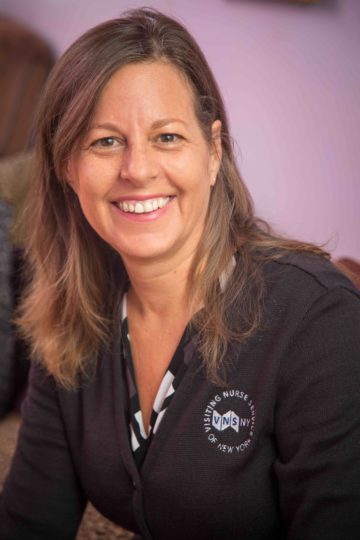
When he still didn’t respond fully, Tinu reached out to VNSNY’s diabetes specialist, Yael Reich, who also worked with Junius. After two weeks of these concerted efforts, Junius announced that he finally understood the connection between taking his medication and controlling his diabetes, and became compliant. When the wound finally healed, Junius gave Tinu the best possible thank-you present, saying to her, “I’m very happy now and am going to check my sugar, take my insulin and see my doctor on a regular basis. Thank you for being so patient with me.”
“Our VNSNY training teaches cultural sensitivity, which is helpful,” says Tinu. But at the end of the day, she adds, nurses also need to be clever psychologists to understand patients’ obstacles to compliance and self-care. Sometimes the obstacles are cognitive, but they can also be financially based, or due to inertia, or—the most common problem—they arise because the patient is in denial. This is where emotional connection and empathy between nurse and patient comes into full play.
“How you talk to patients is just as important as what you say,” says Tinu. “Even as we’re educating, which is a huge part of the job, we need to be motivational as well.” This can be draining, she admits, but when patients finally begin to take responsibility for their own healing, as Junius did, it feels like winning the lottery. “And that,” says Tinu, “makes it all worthwhile.”
* The patient’s name has been changed for privacy.
